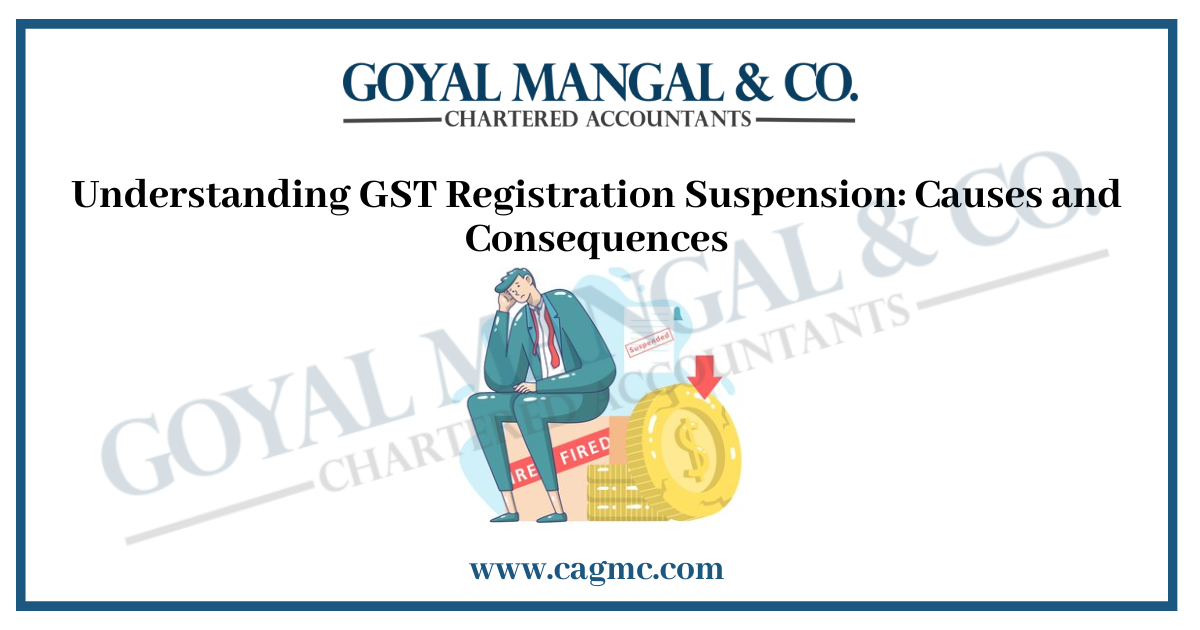
As a taxpayer, you might feel uneasy about your registration being suspended or questioning the reasons behind the suspension of your GST registration. It is important to mention that there is always a valid explanation before terminating any registration. Hence, it is essential to be extremely cautious and vigilant for any possible causes that may lead to the suspension of your GST Registration. In this blog we will give you insights about reasons for Suspension of GST Registration and its consequences.
|
Table of Contents |
Reasons for GST Registration Suspension
Following are the GST Registration suspension reasons:
- If the business is terminated, combined, or separated, transferred, or fully sold for any reason (including the passing of the sole proprietor).
- If there is an alteration in the structure of the business enterprise.
- Section 29 (1) (c) states that if the taxpayer is no longer obligated to be registered under the GST regulations or plans to voluntarily withdraw from GST registration.
- If the taxpayer has violated the regulations stated in Section 29 (2) (a) of CGST ACT 2017
- If the taxpayer who is under the Composition Levy method fails to submit tax returns for three consecutive quarters as mentioned in Section 29 (2) (b) of CGST Act 2017
- If a taxpayer who is not under Composition Levy has failed to file tax returns for six consecutive months, according to Section 29 (2) (c) of CGST Act 2017
- In case the taxpayer has voluntarily registered for GST but has not started their business within six months after the registration is given as per Section 29 (2) (d) of CGST Act 2017
- If the registration has been acquired using dishonest methods, intentionally hiding information, or intentionally providing false information.
- If the individual or entity registered for GST does not engage in business activities from the location they have stated as their place of business,
- If the individual who pays taxes generates an invoice without actually delivering any products or services and breaks the laws established by the CGST Act, 2017 or its corresponding regulations.
- If the taxpayer breaches the antiprofiteering requirement stated in Section 171 of the CGST Act, 2017.
- If the taxpayer fails to comply with Rule 10A of the CGST Rules, 2017 regarding the provision of bank account information.
- If the taxpayer unlawfully utilizes Input Tax Credit (ITC) in contradiction to the guidelines stated in Section 16 of the CGST Act, 2017 (which outlines the eligibility and requirements for claiming ITC) or the corresponding regulations,
- If the total value of goods or services provided in Form GSTR-1 for one or multiple tax periods exceeds the value of goods or services declared in the GST return Form GSTR-3B for the same tax periods.
- If the taxpayer does not fulfil the requirements stated in Rule 86B of the CGST Rules 2017 (which limits the use of funds in the electronic credit ledger) and fails to make cash payments towards the output tax liability.
What are the potential outcomes of suspending GST registration?
Form GST REG-31 is used to inform the taxpayer about any inconsistencies or variations. The document also indicates that if the taxpayer fails to provide a valid explanation, GST could be revoked. If the officer concludes that the reason given is not enough or unsatisfactory, he still has the authority to enforce a suspension.
The taxpayer will not be able to make any tax payment and submit GST return after termination of GST.
A person needs to submit a fresh GST registration application if GST registration of that person is terminated, and that person falls under category of compulsory registration. If this happens, refrain from submitting another application for GST registration. Penalties will be imposed by the GST authorities for any violations of the GST laws.
What actions should be taken following the suspension of GST registration?
If the taxpayer has been given a warning but has not himself/herself asked for registration cancellation, there are a few things to keep in mind.
- Upon receiving a notice regarding inconsistencies: The taxpayer are given a time period of one month from the date of receiving notice about the GST cancellation, so the individual should respond with valid explanation and reason along with proof why the registration should not be cancelled and should provide summary of actions taken to rectify if there is any noncompliance.
- Upon receipt of a cancellation notice: The taxpayer is required to provide a response to the tax officer within one month of receiving the notice by using Form GST Reg 18 on the official GST portal.
- Getting a notification because of failure to submit returns: The GST can be suspended due to Non filing. The non-filing of returns serves as the quintessential example. In case a notification is provided to suspend or cancel registration due to failure in filing necessary returns, the individual mentioned in the notification must complete all the required returns and provide a corresponding reply.

How can one reactivate a suspended GST registration?
If you are a registered taxpayer, and your GST number has been suspended then you must want to know how to activate suspended GST number, you have a period of 30 days during which you can ask to reactivate your GST registration, following the relevant laws in place. Nevertheless, this action can solely be accomplished if the registration is temporarily stopped by an authorized GST officer. Once a registration has been voluntarily suspended, it cannot be undone or reversed. It cannot be denied that the suspension regulations provide a sense of relief to taxpayers. Even though the government has made the process easier, it is still recommended to seek professional help when reactivating a suspended GST registration.
Conclusion
Having a valid GST registration is critically important for businesses to operate lawfully and efficiently. To ensure compliance with the regulations, it is crucial to be knowledgeable about the possible causes that can result in the suspension of your GST registration. By understanding these reasons, you can proactively implement measures to prevent such occurrences. Keep yourself informed about the GST guidelines, submit tax returns punctually, ensure the information provided is precise, and promptly handle any notifications or queries received from the authorities. By taking this action, you can protect your GST registration and keep your business operating smoothly while complying with the law.


